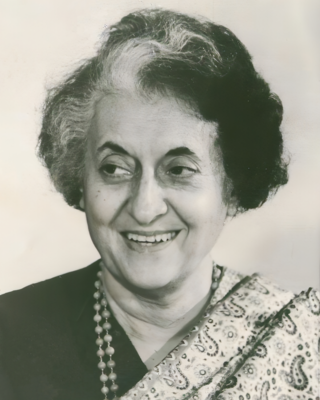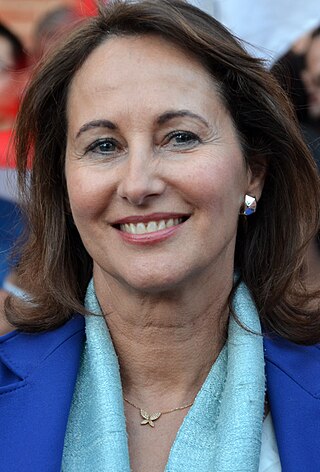Related Research Articles

Indira Priyadarshini Gandhi was an Indian politician and stateswoman who served as the prime minister of India from 1966 to 1977 and again from 1980 until her assassination in 1984. She was India's first and, to date, only female prime minister, and a central figure in Indian politics as the leader of the Indian National Congress (INC). She was the daughter of Jawaharlal Nehru, the first prime minister of India, and the mother of Rajiv Gandhi, who succeeded her in office as the country's prime minister. Gandhi's cumulative tenure of 15 years and 350 days makes her the second-longest-serving Indian prime minister after her father. Henry Kissinger described her as an "Iron Lady", a nickname that became associated with her tough personality.

Margaret Hilda Thatcher, Baroness Thatcher, was a British stateswoman and Conservative politician who served as Prime Minister of the United Kingdom from 1979 to 1990 and Leader of the Conservative Party from 1975 to 1990. She was the longest-serving British prime minister of the 20th century and the first woman to hold the position. As prime minister, she implemented economic policies known as Thatcherism. A Soviet journalist dubbed her the "Iron Lady", a nickname that became associated with her uncompromising politics and leadership style.

Elisabeth Domitien served as the prime minister of the Central African Republic from 1975 to 1976. She was the first and to date only woman to hold the position, and was the first woman to serve as prime minister of a country in Africa.

Ségolène Royal is a French politician who was the Socialist Party candidate for the presidency of France in the 2007 election.

Simone Veil was a French magistrate, Holocaust survivor, and politician who served as Health Minister in several governments and was President of the European Parliament from 1979 to 1982, the first woman to hold that office. As health minister, she is best remembered for advancing women's rights in France, in particular for the 1975 law that legalized abortion, today known as the Veil Act. From 1998 to 2007, she was a member of the Constitutional Council, France's highest legal authority.

Pierre Buyoya was a Burundian army officer and politician who served two terms as President of Burundi in 1987 to 1993 and 1996 to 2003. He was the second-longest-serving president in Burundian history.

Yvonne Pearl Burke is an American politician and lawyer from California. She was the first African-American woman to represent the West Coast in Congress. She served in the U.S. Congress from 1973–1979. She represented the 2nd District on the Los Angeles County Board of Supervisors from 1992–2008. She served as Chair of Los Angeles County four times and served as chair pro tem three times.

Sylvie Kinigi is a Burundian politician and economist who served as prime minister of Burundi from 10 July 1993 to 7 February 1994, and acting president from November 1993 to 5 February 1994, making her the second African woman to serve as a president.
Shirin Aumeeruddy-Cziffra is a British-born Mauritian lawyer, politician and diplomat. She is the head of the Public Bodies Appeal Tribunal (PBAT), which settles disputes of civil servants and local communities in matters related to recruitment and sanctions since 2009. She was Minister of Women’s Rights and Family Affairs from 1982 to 1983, and became the Mayor of Beau Bassin-Rose Hill in 1987. She was Ombudsman for protection of children's rights from 2004 to 2011. She was the first Muslim woman to be elected as a member of the National Assembly and in a ministerial position in mauritius and currently the first one to be speaker of the National Assembly
Martha Wangari Karua is a Kenyan politician. She is a former long-standing member of parliament for Gichugu Constituency and an Advocate of the High Court of Kenya. She was Minister for Justice until resigning from that position in April 2009. She has consistently fought for the protection of women's rights and improvements to the democratic process.

Burundi, officially the Republic of Burundi, is a landlocked country in the Great Rift Valley at the junction between the African Great Lakes region and Southeast Africa, with population of over 14 million people. It is bordered by Rwanda to the north, Tanzania to the east and southeast, and the Democratic Republic of the Congo to the west; Lake Tanganyika lies along its southwestern border. The capital city is Gitega and the largest city is Bujumbura.

Maite Emily Nkoana-Mashabane, formerly known as Maite Mohale, is a South African politician who served as the Minister of Women, Youth and Persons with Disabilities. She was Minister of Rural Development and Land Reform from 2018 to 2019, and previously served as Minister of International Relations and Cooperation from 2009 to 2018. Nkoana-Mashabane is also a former member of the National Executive Committee of the African National Congress (ANC).

Elizabeth Dipuo Peters is a South African politician who is the Deputy Minister of Small Business Development of the Republic of South Africa from 7 March 2023. She was previously the Minister of Transport from 10 July 2013 until 30 March 2017, in the Zuma administration, and former Minister of Energy from 2009 to 2013 having served as successor to Manne Dipico as the second Premier of the Northern Cape Province, 22 April 2004 to 10 May 2009. A member of the African National Congress (ANC), she serves on the Women's League National Executive Committee. Dipuo Peters resigned as a member of parliament for the African National Congress in April 2017.
Victoria Fikile Chitepo was a South African - Zimbabwean politician, activist and educator. She was the wife of Herbert Chitepo, a leading figure in the Zimbabwe African National Union (ZANU), but was a major political figure in her own right and served as a minister in the government of independent Zimbabwe between 1980–1992.
Rosemary Bikaako Tumusiime is a Ugandan marketing professional, public administrator, feminist and politician. She is the elected Member of Parliament for Entebbe Municipality and is a representative for NRM, the ruling political party in Uganda. She is the first female representative for the constituency in over three decades and succeeded Muhammad Kawuma who served for two consecutive terms from 2006 to 2016. In the 10th Parliament, she serves as a member of the Committee on Equal Opportunities and the Committee on Presidential Affairs. She is also a member of the NRM Parliamentary Caucus, the Buganda Parliamentary Caucusand the treasurer of the Network for African Women Ministers and Parliamentarians (NAWMP).
Caritas Mategeko Karadereye was a Burundian politician and activist. Alongside Euphrasie Kandeke, who was named Minister for Women's Questions, she became one of the first women to serve in the Burundian cabinet when she was appointed Minister of Social Affairs by Jean-Baptiste Bagaza in 1982. At the time, she was the vice-secretary general of the Union of Burundian Women. She remained in the cabinet until 1987. During her career, she also spent time as a local representative for the Director General of UNESCO. Mategeko was a Tutsi; her sister, a student, was among those slain during the Burundian genocide of 1972. Karadereye also wrote on the subject of women and Burundian society, publishing a paper on the subject in 1969.
Clotilde Niragira was a Burundian politician and lawyer. She served as head of three separate ministries in Pierre Nkurunziza's government and was Secretary-General of Burundi's Truth and Reconciliation Commission.

The Ikiza, or the Ubwicanyi (Killings), was a series of mass killings—often characterised as a genocide—which were committed in Burundi in 1972 by the Tutsi-dominated army and government, primarily against educated and elite Hutus who lived in the country. Conservative estimates place the death toll of the event between 100,000 and 150,000 killed, while some estimates of the death toll go as high as 300,000.
Irene Natividad is an American feminist, women's rights activist, corporate director, international advocate for women in leadership positions, President of the GlobeWomen Research and Education Institute, a non-profit organization based in Washington, DC whose lead programs include the annual Global Summit of Women and Corporate Women Directors International (CWDI). She previously served as Chair of the National Women's Political Caucus, Chair of the National Commission on Working Women, Executive Director of the Philippine American Foundation, Founder and President of Asian American Professional Women, and Founding Director of the National Network of Asian-Pacific American Women.
References
- 1 2 Jeune Afrique. Les Editions J.A. 1982.
- 1 2 "Net Press". www.netpress.bi. Retrieved 6 November 2017.
- 1 2 "Burundi Ministers". www.guide2womenleaders.com. Retrieved 6 November 2017.
- ↑ Daily Report: People's Republic of China. National Technical Information Service. 1980.
- ↑ Women's International Network News. Women's International Network. 1980.
- ↑ Colin Legum (1989). Africa Contemporary Record: Annual Survey and Documents. Africa Research Limited. ISBN 9780841905580.
- ↑ New African. IC Magazines Limited. 1987.
- ↑ Raphaël Ntibazonkiza (1992). Au royaume des seigneurs de la lance: De l'indépendance à nos jours (1962-1992). Bruxelles droits de l'homme. ISBN 978-2-9600041-1-3.